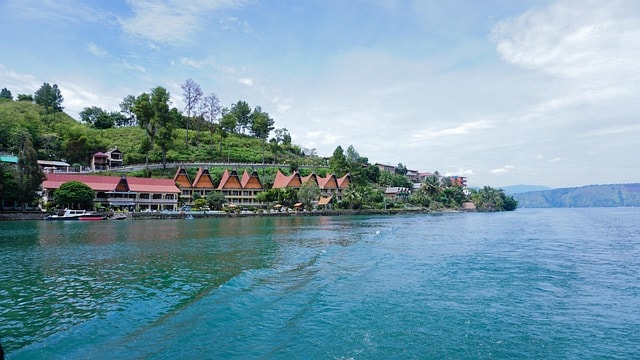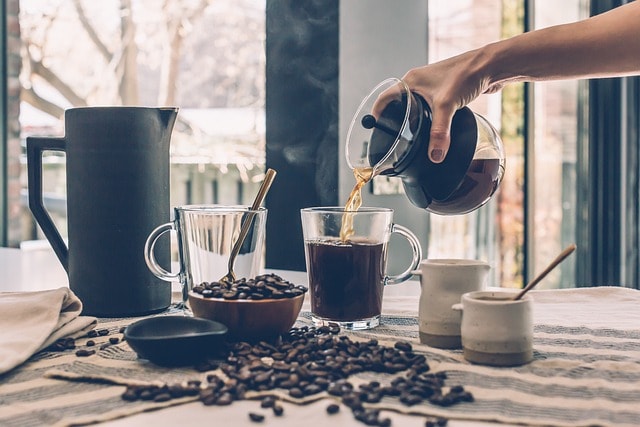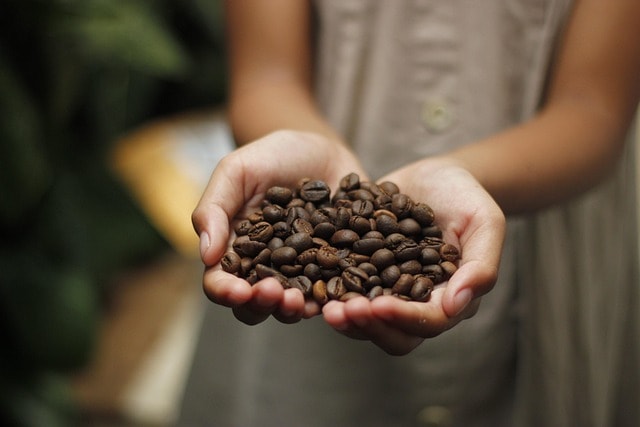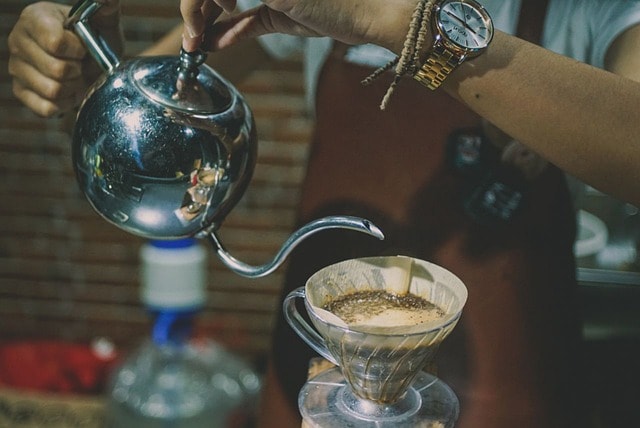Sumatra coffee, with its earthy flavor and rich body, is a standout among global coffee varieties. Grown under unique conditions and processed with traditional methods like Giling Basah, this coffee, known as Coffee Sumatra, has a distinct character. This guide explains what sets Sumatra coffee apart.
Key Takeaways
- Sumatra coffee is characterized by its full-bodied flavor and low acidity, influenced by the island’s rich volcanic soil and unique processing methods.
- The wet hulling process, exclusive to Sumatra, retains moisture and enhances the coffee’s earthy, spicy, and sweet flavor profiles.
- Sourcing practices in Sumatra prioritize sustainability and fair compensation for farmers, contributing to the environmental and economic well-being of local communities.
Introduction to Sumatran Coffee
Sumatran coffee, hailing from the lush Indonesian island of Sumatra, is renowned for its rich, heavy body and low acidity. This coffee’s unique flavor profile is a testament to the island’s rich volcanic soil, high altitude growing conditions, and the traditional wet-hulling processing method used by local farmers. The result is a full-bodied coffee with an earthy flavor profile, often accented by notes of brown sugar and a hint of spice. For those who appreciate a robust and complex cup, Sumatran coffee is a great coffee choice that never disappoints.
Discovering Sumatra Coffee

Sumatra coffee, with its deep, rich flavors and captivating aromas, originates from the Indonesian island of Sumatra. This island is the largest in Indonesia, known for its remarkable biodiversity and unique geographical features. The coffee beans cultivated here are predominantly from regions such as Aceh, North Sumatra, West Sumatra, and South Sumatra, each contributing its own unique flavor profile. Sumatra coffee is often grown at high altitudes, which contributes to its unique flavor profile.
Sumatra’s tropical climate, marked by abundant rainfall and warm temperatures, creates ideal conditions for high-quality coffee cultivation. The island’s rich volcanic soil further enhances the distinctive taste and aroma that make Sumatran coffees celebrated worldwide.
The Indonesian Island
Sumatra, the largest island in Indonesia, is a land of contrasts, featuring mountainous terrains, lush forests, and a climate perfect for coffee cultivation. This Indonesian island’s rich biodiversity and unique microclimates contribute significantly to the distinct flavor profiles of Sumatran coffee.
Rich volcanic soil and a tropical climate create perfect conditions for high-quality coffee beans. These geographical features enhance growth and impart the unique earthy and rich flavor profiles that Sumatran coffees are renowned for globally.
Rich Volcanic Soil
The rich volcanic soil in Sumatra is key to its coffee’s complex and earthy flavor profile. Packed with essential nutrients, this soil contributes to the distinctive taste and robust foundation of the coffee’s complex flavors.
Smallholder farmers in Sumatra often utilize traditional farming techniques, which further enhance the unique flavor profiles of the coffee. These methods, combined with the nutrient-rich volcanic soil, result in Sumatran coffee that is both rich in flavor and deeply satisfying.
Sumatran Coffee Beans
Sumatran coffee beans are cultivated at high altitudes, typically ranging from 4,500 to 6,000 feet above sea level, in the volcanic regions of Sumatra. These high-altitude conditions, combined with the nutrient-rich volcanic soil, contribute to the beans’ distinctive heavy body and low acidity. Coffee connoisseurs often favor Sumatran coffee beans for their ability to produce a rich, full-bodied brew. Available in various roast levels, including dark roast, these beans bring out the coffee’s earthy and spicy notes, making each cup a unique experience.
Flavor Profile of Sumatra Coffee

Sumatra coffee is known for its full-bodied flavor and low acidity, making it a favorite among coffee enthusiasts. The island’s unique growing conditions, including nutrient-rich volcanic soil and tropical climate, significantly contribute to its complex flavor profile.
Sumatra coffee stands out for its bold, earthy, and herbal notes. This complex flavor profile reflects the meticulous cultivation and processing methods employed by local farmers.
Earthy and Spicy Notes
One of the most distinctive features of Sumatra coffee is its earthy flavor profile, often accompanied by spicy notes. The nutrient-rich volcanic soil enhances these flavors, giving the coffee a complexity and depth that is hard to find elsewhere. Hints of cedar, pepper, and other spices are commonly noted, adding to the coffee’s unique character.
The wet hulling technique used in processing Sumatran coffee further contributes to its earthy qualities. This method results in a full-bodied coffee with a heavy, velvety texture, enriched with herbal and spicy undertones that coffee aficionados love.
Sweet and Dark Chocolate Hints
In addition to its earthy and spicy notes, Sumatra coffee often features sweet undertones of brown sugar and rich dark chocolate. These flavors balance the coffee’s robust profile, adding a layer of sweetness that complements its deep, complex taste.
The minerals in the volcanic soil contribute significantly to these sweet flavors, making Sumatra coffee not only complex but also delightfully rich. When brewed, these beans reveal a harmonious blend of earthy, spicy, and sweet notes, making for a truly satisfying cup of coffee.
Processing Techniques
The unique processing techniques used in Sumatra play a crucial role in defining its distinctive flavor and body. One such method is the wet hulling process, known locally as Giling Basah. This technique is specifically designed to suit the island’s humid climate, allowing for rapid processing while preserving the coffee’s unique characteristics.
Sumatra coffee is typically noted for its full-bodied texture and smooth, earthy undertones. The wet hulling process, along with the island’s unique growing conditions, significantly impacts the coffee’s final flavor profile, making it stand out among other varieties.
Wet Hulling Process
The wet hulling process is unique to Sumatra and involves several stages that contribute to the coffee’s exceptional freshness and quality. Initially, the coffee beans are depulped within one to two days, retaining the mucilage until they are sold to a mill. This early removal of the parchment layer sets it apart from traditional coffee processing methods.
Typically, Sumatran coffee beans are hand-processed and roasted to maximize freshness and flavor retention. This meticulous process ensures that the coffee’s unique characteristics are preserved, resulting in a rich and aromatic brew.
Impact on Flavor and Body
The wet hulling process significantly impacts the flavor and body of Sumatra coffee. This method retains higher moisture content in the beans, resulting in a denser and more substantial body, giving Sumatra coffee its characteristic heavy and full-bodied texture.
The flavors developed during the wet hulling process are complex and earthy, often accompanied by herbal and spicy notes. This method enhances the natural oils and flavors of the coffee, creating a rich and satisfying taste experience.
Brewing Methods for Sumatra Coffee

Appreciating Sumatra coffee’s rich flavors requires the right brewing methods. Both the French press and great coffee pour-over techniques are recommended for effectively highlighting its nuanced flavors and robust body.
These methods ensure the coffee’s complex flavor profile is fully extracted, offering a rich and satisfying cup. Choosing the right brewing technique can significantly impact the taste and aroma, so select one that best suits your preferences.
French Press
Brewing Sumatra coffee with a French press emphasizes its heavy body and robust flavors. Start by coarsely grinding the beans to enhance extraction. Use a ratio of 54 grams of ground coffee to 900 ml of water for optimal results.
Allow the coffee to steep for four minutes before pressing the plunger down slowly. This method enhances the natural oils and flavors of the coffee, resulting in a bold, smooth cup that highlights the best of Sumatra coffee.
Pour Over
The pour-over method also works well for brewing Sumatra coffee, allowing for controlled extraction that highlights its intricate flavors. This method captures the rich aroma and smooth notes, providing a balanced and flavorful cup.
To brew using the pour-over method, start by heating water to the appropriate temperature and slowly pouring it over the coffee grounds in a circular motion. This technique ensures a thorough extraction, enhancing the overall flavor and aroma of the coffee.
Quality and Authenticity
Sumatran coffee is celebrated for its exceptional quality and authenticity, a result of the unique combination of rich volcanic soil, high altitude, and traditional wet-hulling processing methods. The coffee beans grown on the Indonesian island of Sumatra are meticulously hand-picked and processed to ensure the highest quality and a distinct flavor profile.
One of the key contributors to the quality of Sumatran coffee is the region’s rich volcanic soil. This soil is packed with essential nutrients and minerals that nourish the coffee plants, enhancing their growth and flavor. The high altitude, ranging from 4,500 to 6,000 feet above sea level, also plays a crucial role in developing the coffee’s complex flavor profile. These high-altitude conditions slow the growth of the coffee beans, allowing them to develop deeper, more nuanced flavors.
The traditional wet-hulling process, known locally as Giling Basah, is another factor that sets Sumatran coffee apart. This method involves partially drying the coffee beans before removing the parchment layer, which results in a distinctive earthy flavor profile and a heavy body. The wet-hulling process retains more moisture in the beans, contributing to their dense and full-bodied texture.
To ensure the authenticity of Sumatran coffee, look for certifications such as Fair Trade and USDA Organic. These certifications guarantee that the coffee is grown and processed according to strict standards, ensuring ethical practices and high quality. Additionally, choose a reputable coffee roaster that sources high-quality beans directly from small-scale farmers in Sumatra. This direct trade approach supports local communities and ensures you receive the freshest beans.
When brewing Sumatran coffee, using a French press or pour-over method can bring out the full flavor and aroma of the coffee. These methods highlight the coffee’s complex flavor profile, including its earthy and spicy notes. Pairing Sumatran coffee with dark chocolate or a touch of brown sugar can complement its rich and earthy flavor profile, creating a delightful tasting experience. Whether you’re a coffee connoisseur or simply looking for a great coffee, Sumatran coffee is an excellent choice that is sure to satisfy your taste buds.
Pairing Sumatran Coffee with Food
Sumatran coffee is a versatile brew that pairs exceptionally well with desserts and chocolatey foods, particularly dark chocolate. The coffee’s earthy and spicy notes create a harmonious balance with sweet flavors, enhancing the overall tasting experience. For those who enjoy a complex flavor profile, pairing Sumatran coffee with a rich dessert can be a delightful treat. However, this great coffee can also be savored on its own, allowing its full-bodied and intricate flavors to shine through.
Sourcing and Sustainability

Sourcing and sustainability are crucial aspects of Sumatra coffee production. Many Sumatra coffee farmers utilize organic farming techniques, minimizing the use of synthetic fertilizers and pesticides to promote environmental sustainability. Ethical sourcing practices ensure that local communities benefit from coffee production through fair compensation and improved working conditions.
Sustainable coffee production in Sumatra includes initiatives like shade-grown methods that preserve biodiversity and optimize microclimates for coffee cultivation. These practices not only protect the environment but also support the livelihoods of smallholder farmers.
Smallholder Farmers
Smallholder farmers play a vital role in Sumatra coffee production, managing small plots of land and contributing significantly to the local economy. These farmers often use traditional cultivation techniques, hand-picking coffee cherries to ensure only the ripest fruits are selected, which enhances the quality of the final product.
Sustainable Practices
Sustainable practices are at the heart of Sumatra coffee production. Many farmers use organic farming methods, which help maintain soil health and protect local ecosystems. These practices minimize the use of synthetic fertilizers and pesticides, promoting environmental sustainability and ensuring the long-term viability of coffee production.
Initiatives like shade-grown coffee help preserve biodiversity and optimize the microclimates necessary for high-quality coffee cultivation. These sustainable practices not only benefit the environment but also improve the livelihoods of local farming communities.
Why Choose Sumatra Coffee?

Sumatra coffee is highly regarded for its distinct flavor profiles, making it a favorite among coffee enthusiasts. The island is recognized as one of the world’s premier coffee origins, offering a unique sensory experience that’s hard to match.
Choosing Sumatra coffee supports ethical sourcing practices that benefit local farmers and communities. Producers increasingly adopt Fair Trade practices, ensuring better prices and working conditions for farmers, making every cup delicious and socially responsible.
Unique Taste and Aroma
The unique taste and aroma of Sumatra coffee are a result of traditional farming methods passed down through generations. These family-run farms use techniques that significantly enhance the coffee’s flavor profile, resulting in an exceptional quality that is both full-bodied and aromatic.
Sumatra coffee’s distinctive flavor profile includes earthy, spicy, and sweet notes, making it a complex and satisfying brew. Its low acidity and rich body further enhance its unique taste, ideal for those who appreciate a bold and flavorful cup.
Quality and Freshness
Sumatra coffee is celebrated for its high-quality beans, carefully graded to ensure only the best reach consumers. This meticulous grading preserves the coffee’s complex flavor profile, offering a rich and satisfying taste experience.
Freshly roasted Sumatra coffee is typically shipped directly from producers, ensuring optimal flavor and quality for consumers. This combination of high-quality beans and fresh delivery makes Sumatra coffee an excellent choice for coffee enthusiasts who value quality and freshness.
Summary
Sumatra coffee offers a unique and complex flavor profile that is deeply rooted in the island’s rich volcanic soil and traditional farming practices. Its full-bodied nature, low acidity, and distinctive earthy, spicy, and sweet notes make it a favorite among coffee enthusiasts. The wet hulling process and sustainable farming practices further enhance the quality and flavor of this exceptional coffee.
By choosing Sumatra coffee, you are not only enjoying a great coffee experience but also supporting ethical and sustainable practices that benefit local farming communities. So, the next time you brew a cup of coffee, let it be Sumatra coffee and savor the rich heritage and flavors it brings.
Conclusion
In conclusion, Sumatran coffee stands out as a unique and flavorful choice for coffee enthusiasts who appreciate a full-bodied, earthy flavor profile. The combination of Sumatra’s rich volcanic soil, high-altitude growing conditions, and the traditional wet-hulling processing method results in a coffee that is both complex and satisfying. Whether enjoyed on its own or paired with desserts or dark chocolate, Sumatran coffee offers a rich and rewarding experience that is sure to satisfy any coffee craving.
Frequently Asked Questions
What makes Sumatra coffee unique?
Sumatra coffee stands out for its full-bodied flavor, low acidity, and complex profile characterized by earthy, spicy notes, and sweet undertones. The unique taste is enhanced by the rich volcanic soil and traditional farming methods employed in its cultivation.
What is the wet hulling process?
The wet hulling process, or Giling Basah, involves removing the parchment layer from coffee seeds prior to complete drying, particularly in Sumatra, to maintain the coffee’s distinct qualities. This technique enhances the flavor profile, resulting in a unique cup of coffee.
How should I brew Sumatra coffee for the best flavor?
To achieve the best flavor from Sumatra coffee, use a French press for a full-bodied experience or a pour-over method to accentuate its intricate flavors and rich aroma. Choosing the right brewing method will significantly enhance your coffee enjoyment.
Are Sumatra coffee beans sustainably sourced?
Yes, many Sumatra coffee beans are sustainably sourced, with farmers employing organic farming techniques and ethical practices that promote fair compensation and improve working conditions for local producers.
Why should I choose Sumatra coffee?
Choosing Sumatra coffee will enhance your taste experience with its rich, complex flavor and full-bodied texture, while also supporting ethical and sustainable practices that benefit local farming communities.


